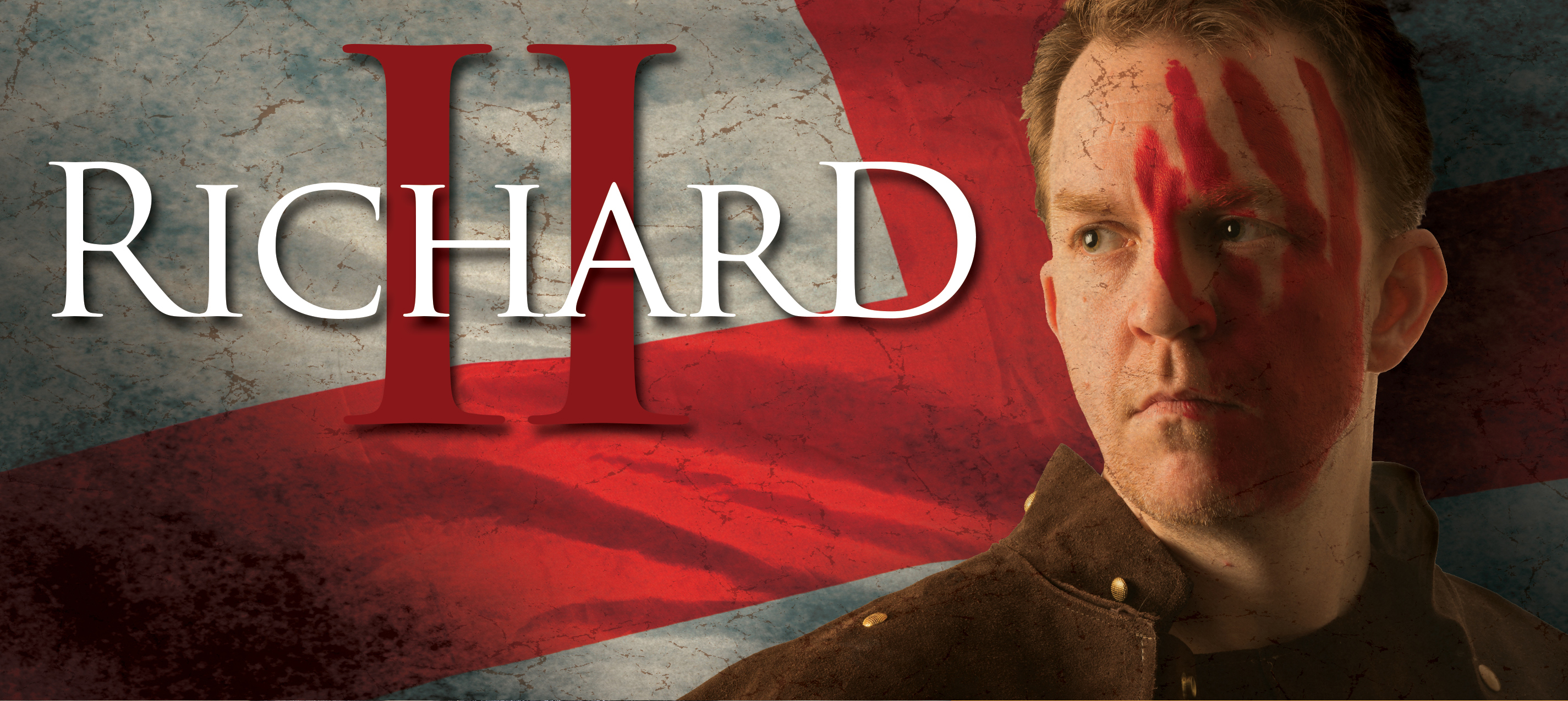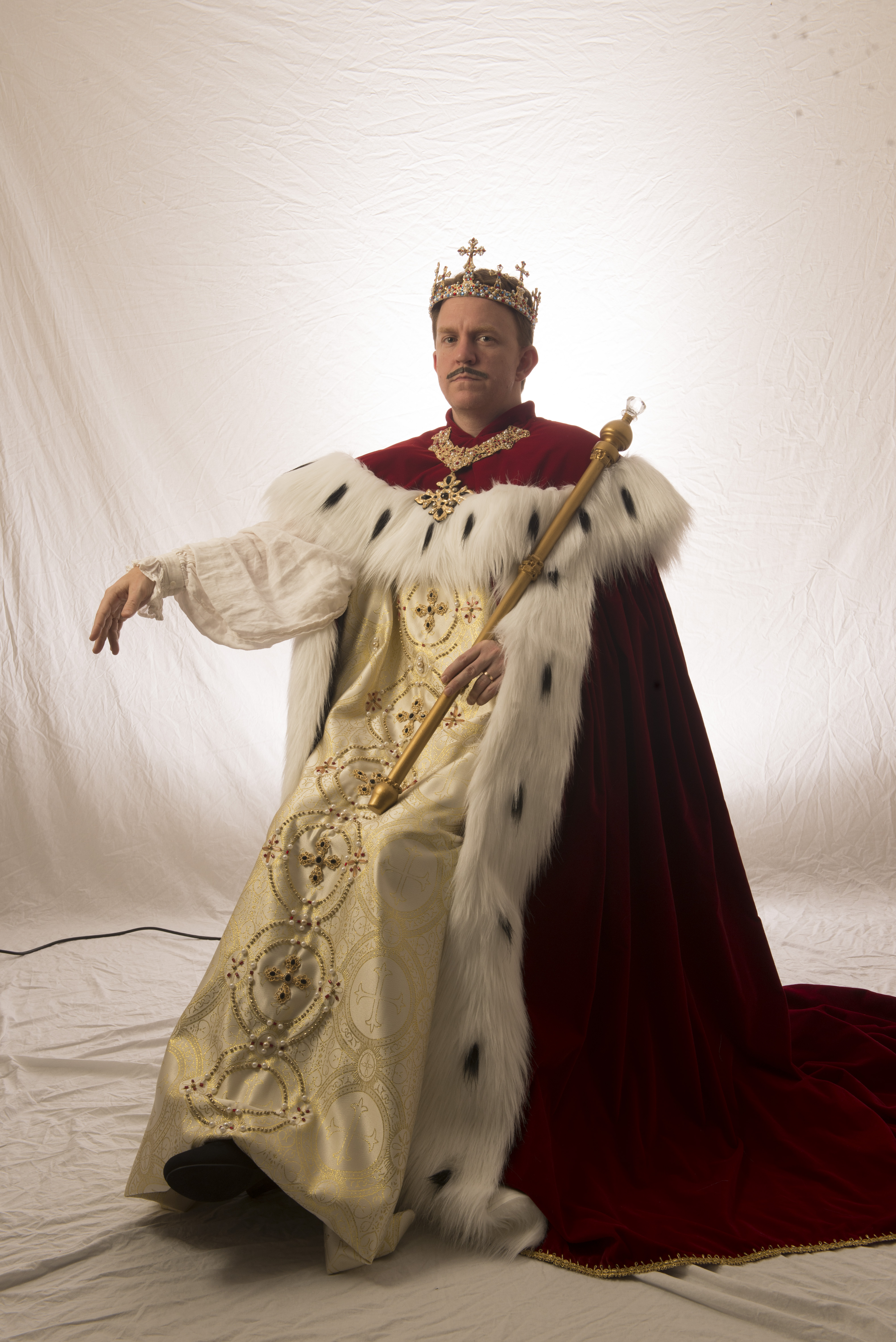
Richard II

King Richard believes he has been ordained by God to rule England, but he is surrounded by men who would prey on his weakness. Spoiled by fortune and more poet than monarch, his vanity begins to divide his country and send it into tumultuous and horrible civil war. But even as he loses all his power and worldly possession, does Richard gain something greater? Robert Quinlan (Macbeth, 2013) returns to direct this lyrical, profound and moving production, which will feature artistic director Kevin Rich in the title role.
- Synopsis
- Dramaturgical Notes
- Reviews
Henry Bolingbroke, cousin to the King and son of John of Gaunt, accuses Thomas Mowbry, Duke of Norfolk, of crimes including the murder of the Duke of Gloucester. Mowbry denies the charges, and Richard orders a duel to settle the disagreement. Gloucester's widow begs Gaunt to take action against the men who murdered her husband. Believing Richard responsible for the murder, Gaunt refuses, saying that the King answers only to God. Mowbry and Bolingbroke prepare to duel. Richard intervenes and orders both men banished. Gaunt and Bolingbroke tearfully say goodbye. With his funds dwindling, Richard reveals a plan to lease lands. Upon learning that Gaunt is dying, Richard is pleased, as he plans to use Gaunt's fortunes to fund the war in Ireland. Gaunt tells Richard with his last breaths that he is ruining England by unwisely taxing the poor and spending frivolously. Richard seizes Gaunt's property – what would have been Bolingbroke's inheritance – and leaves to supervise the fighting in Ireland. Bolingbroke arrives in Ravensburgh to fight for Gaunt's property. York prepares an army to greet Bolingbroke's forces. Bushy and Greene flee to Bristow Castle, and Bagot goes to meet Richard in Ireland. In Richard's absence, Bolingbroke slowly makes his way through England, winning over allies. Returning from Ireland, Richard learns that his troops have been disbanded, his allies Bushy and Greene have been executed, and the man he trusted to defeat Bolingbroke (York) instead has joined him. Feeling powerless, Richard ultimately agrees to return Gaunt's property to Bolingbroke and rescind his banishment. He then accompanies Bolingbroke to London after surrendering. Richard is imprisoned in Pomfret Castle and Bolingbroke is crowned King Henry IV. The play concludes with Richard's murder, carried through at the new King's orders. Bolingbroke vows to journey to the Holy Land to rid his conscience of Richard's death.
"For God's sake, let us sit upon the ground / And tell sad stories of the death of kings."
Grappling with leadership questions, power struggles, and political family dynasties, Richard II continues to prove itself just as pertinent today as it was in 1595. Beverley Warner's description of Richard's downfall might as easily translate to any number of (unnamed) public figures today: "A youth spent in weakness and folly foreshadows a manhood of decay and impotency."
When William Shakespeare put quill to paper in 1595, he created a lyrical masterpiece. One of Shakespeare's lesser known history plays, Richard II is written entirely in verse. It is also the first in Shakespeare's second tetralogy, referred to by some as the 'Henriad'. This series of plays follows the story of King Richard's successor and includes Henry IV, Part 1; Henry IV, Part 2; and Henry V. Shakespeare wrote one play every year, finishing the tetralogy in 1599.
In his book The English History Play in the Age of Shakespeare, Irving Ribner writes, "When he came to write Richard II, Shakespeare had developed both as a dramatic craftsman and as a thinker, and he could examine political problems with new insight." Shakespeare consulted more works to write Richard II than any of the others in the Henriad, and he crafted the politics so keenly that the "deposition scene" (the scene in which Richard is formally removed from power) was considered explosive. The scene is left out of the three quarto versions of the play published between 1597-1598 – during Queen Elizabeth's lifetime – and only appears in print in 1608, five years after her death. By this time, tensions over succession to the throne and scandals caused by ambitious challengers were no longer important. Nonetheless, the parallels that one could make between Shakespeare's representation of King Richard II, and the very real royal, Queen Elizabeth, helped to build the play's popularity.
Queen Elizabeth I became Queen at the age of 25, ruled from 1588 to 1603, and was the last of the Tudor line of monarchs. Because she never married and had no heirs, she left the crown vulnerable – and faced multiple challenges, including the "Essex Rebellion," led by Robert Devereux, the Second Earl of Essex. (Audiences may remember that the Earl of Essex figured prominently in the story of last season's Elizabeth Rex. As it goes, Richard II figured prominently in the Earl of Essex's actual rebellion.) Essex had been in the Queen's good graces. However, after returning in disgrace from an unsuccessful command in Ireland's Nine Years War, his relationship to the Queen changed. Essex was tried and temporarily imprisoned, and once freed, he began planning a coup d'etat. To gain more popular support, he paid The Lord Chamberlain's Men, Shakespeare's company, a handsome sum to stage Richard II on the eve of the rebellion – with the deposition scene intact. The rebellion was stopped the next day, but the significance of performing the deposition scene was not lost on the Queen. C.W.R.D. Moseley writes, "When in 1601 the historian William Lambarde was showing Elizabeth the fruits of his researches in the royal archives and arrived at the time of Richard II, she broke in: 'I am Richard II. Know ye not that? . . .' In the rebellion of Essex, she saw echoes of Bolingbroke."
Bolingbroke, the Duke of Hereford and cousin to Richard, presents a new leadership to the people of England. If Richard rules by self-interest, taxing the people and the land to pay for his war with Ireland, Bolingbroke appeals to the masses through empathy and genuine political skill. It is this that Warren Chernaik defines as the central paradox of the play: "...of the two claimants to the throne, one possesses legitimacy but shows himself to be unfit to rule, while the other, lacking legitimacy, demonstrates the political skills and self-control his opponent lacks." Shakespeare's skill as a master storyteller, however, results in a remarkable balance of sympathies for both men. The embattled deposition scene, which in another play might be full of swords and poison, begins with beautiful verse as Richard relinquishes his hold on the crown – literally and metaphorically – and begins his tragic self-awakening. In his final scene, one can't help but hear the echoes of the famous early line that opened these notes, as Richard himself begins to understand the sad story of the death of a king.
By: Heather Carnahan and Treasure Radice with Ann Haugo
For further reading:
Bennett, Michael. Richard II and the Revolution of 1399. The History Press, 2006.
Chernaik, Warren. The Cambridge Introduction to Shakespeare's History Plays. Cambridge University Press, 2007.
Norwich, John Julius. Shakespeare's Kings: The Great Plays and the History of England in the Middle Ages: 1337-1485. Scribner, 2001.
The Pantagraph: Weiss: A game of thrones with real drama
- “Richard's saga, while murky on the Internet, is crystal-clear when presented on stage by a company of actors who are masters of their craft.”
- “a gloriously simple and elegant set”
- “meticulous attention to detail”
- “It was heartening to see so much talent from Illinois State University's theater department grace the stage, teachers and students alike”
